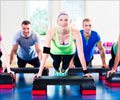Physical exertion can entice those who do sport to eat larger amounts of food more quickly after the training session. New interventions are needed to optimize weight loss.

- Food consumption increases after physical activity, especially in people who wanna lose weight
- More calories are consumed through sport than when sitting, standing or lying down
- New interventions need to be developed to change the eating behaviors in overweight and obese individuals
But what influence does sport have on (direct) eating habits? Scientists at the Technical University of Munich (TUM) and the University of Nebraska (USA) have now investigated this question for the first time.
Randomized Study
"In the sports context, we have the phenomenon of people overeating after physical activity," said Prof. Köhler, Professor of Exercise, Nutrition and Health at the Technical University of Munich. "People want to reward themselves and their bodies for being active. So we use a hypothetical experiment to find out why people eat more after exercise compared to when they don't exercise."
The aim of a randomized crossover study was to investigate the influence of exercise on hypothetical decisions regarding the amount and timing of food intake.
Subjective Assessment of Hunger and Satiety
After answering the first questionnaire, participants performed 45 minutes of aerobic exercise on a bicycle ergometer. Immediately afterwards, they completed the electronic questionnaire a second time and then a third time after a 30-minute break. The procedure for the group without training was identical; instead of 45 minutes of physical activity, these participants had a rest break.
Compared to the rest break, exercise provided a greater increase in the amount of food chosen, both immediately after exercise and 30 minutes afterwards. Physical activity also resulted in a greater increase in preference for immediate food consumption both immediately after exercise and 30 minutes afterwards.
Weight Loss through Exercise
"Based on this study, we were able to show for the first time that certain characteristics, such as the amount and 'urgency' with which a person wants to eat, change over the course of physical exertion," said Prof. Köhler, classifying the results. "These findings help us develop new interventions to optimize weight loss through exercise."
"The actual results suggest that physical exertion can entice those who do sport to eat larger amounts of food more quickly after the training session," says Prof. Köhler. "Since weight loss is a main motivation for exercising for many, and failure to achieve the desired weight loss makes it likely to quit exercising, it could be a good strategy to think about what you want to eat afterwards before you start to exercise."
How effective these and other possible strategies work, how they can improve long-term compliance with training programs and contribute to favorable health results through weight loss and whether the effect may eventually wear off, is the subject of the current research of the scientists.
Source-Eurekalert













